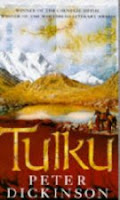Tulku by Peter Dickinson
Another re-read; sometime in the early 1980s, not long after it was first published, I found Tulku in the library. Both OH and I read it, and thought it a tremendous piece of storytelling. Although it disappeared from the local library I hadn’t forgotten it, and was delighted to find a copy in our local bookshop recently.
Except for the bare outlines of the story – a young boy, escaping from the Boxers during the Taiyuan massacre in 1900, reaches the Tibetan border where he meets a monk who is seeking a reincarnated lama – I had forgotten most of the narrative, and the story seemed entirely fresh to me. Thirteen-year-old Theo is the son of an American missionary killed in the massacre, and when he meets Mrs Jones, an indomitable Victorian plant hunter, he is prepared to dislike her for her vulgarity and even more for her ready cursing, but he allows himself to be persuaded into travelling with her to the safety of the nearest mission. Her eventual plan is to cross the border into the forbidden land of Tibet, where new plants may be found. On their way to seek the sanctuary of the mission for Theo, however, they again encounter the rebels, and they find themselves driven towards the border.
Mrs Jones is delighted by this development, and Theo finds himself grudgingly beginning to like her, attracted by her fierce courage and directness. There is a brief idyll in the mountains - Mrs Jones botanises, finding a hitherto unknown lily, her Chinese guide Lung composes poetry, and Theo draws and explores. But they have been followed by bandits and are forced to flee, fortuitously meeting the Lama Amchi who takes them to the monastery of Dong Pe. Here, the arrival of a Tulku – the reincarnation of a “great soul”, in this case the Siddha Asara – is eagerly anticipated. Some thirteen years have passed since the death of the Siddha’s last incarnation, and his imminent return has been predicted by the monastery’s oracle monk. Perhaps the arrival of Theo and his travelling companions is pre-determined?
Tulku's period atmosphere is superbly executed and there is a real sense in the monastery of both fascination and claustrophobia, of events unfolding which are beyond the control of the players. The necessary details of tensions between China and Tibet are economically conveyed so that an extensive knowledge of the Boxer Rebellion is not required. In 1979, when it was published, it won both the Whitbread Children's Book Award and the Carnegie Medal, and in its sensitive explorations of complex relationships, other cultures and the nature of belief, is an excellent choice for older teenagers.
The clip below, from a recent Canadian film about the finding of Tulkus in the west (an intriguing notion) shows the kind of costumes Theo would have seen during ritual dances at Dong Pe. I'd hoped to be able to find some of my own pictures taken at the opening of Scotland's Tibetan Centre, Samye Ling, in 1988, but I can't find them. If I ever do, I shall post some of them, because the costumes were amazing.
Except for the bare outlines of the story – a young boy, escaping from the Boxers during the Taiyuan massacre in 1900, reaches the Tibetan border where he meets a monk who is seeking a reincarnated lama – I had forgotten most of the narrative, and the story seemed entirely fresh to me. Thirteen-year-old Theo is the son of an American missionary killed in the massacre, and when he meets Mrs Jones, an indomitable Victorian plant hunter, he is prepared to dislike her for her vulgarity and even more for her ready cursing, but he allows himself to be persuaded into travelling with her to the safety of the nearest mission. Her eventual plan is to cross the border into the forbidden land of Tibet, where new plants may be found. On their way to seek the sanctuary of the mission for Theo, however, they again encounter the rebels, and they find themselves driven towards the border.
Mrs Jones is delighted by this development, and Theo finds himself grudgingly beginning to like her, attracted by her fierce courage and directness. There is a brief idyll in the mountains - Mrs Jones botanises, finding a hitherto unknown lily, her Chinese guide Lung composes poetry, and Theo draws and explores. But they have been followed by bandits and are forced to flee, fortuitously meeting the Lama Amchi who takes them to the monastery of Dong Pe. Here, the arrival of a Tulku – the reincarnation of a “great soul”, in this case the Siddha Asara – is eagerly anticipated. Some thirteen years have passed since the death of the Siddha’s last incarnation, and his imminent return has been predicted by the monastery’s oracle monk. Perhaps the arrival of Theo and his travelling companions is pre-determined?
Tulku's period atmosphere is superbly executed and there is a real sense in the monastery of both fascination and claustrophobia, of events unfolding which are beyond the control of the players. The necessary details of tensions between China and Tibet are economically conveyed so that an extensive knowledge of the Boxer Rebellion is not required. In 1979, when it was published, it won both the Whitbread Children's Book Award and the Carnegie Medal, and in its sensitive explorations of complex relationships, other cultures and the nature of belief, is an excellent choice for older teenagers.
The clip below, from a recent Canadian film about the finding of Tulkus in the west (an intriguing notion) shows the kind of costumes Theo would have seen during ritual dances at Dong Pe. I'd hoped to be able to find some of my own pictures taken at the opening of Scotland's Tibetan Centre, Samye Ling, in 1988, but I can't find them. If I ever do, I shall post some of them, because the costumes were amazing.



Comments
Post a Comment